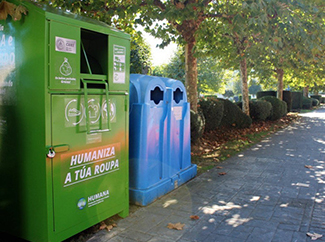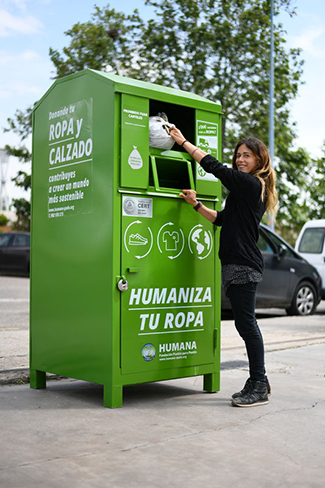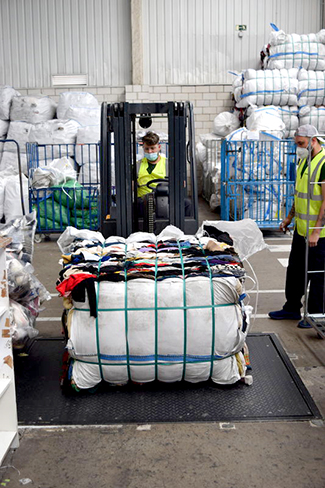consent_cookie
Duración: 1 year
Stores the user's cookie consent state
16-05-2024
Humana Fundación Pueblo para Pueblo claims the responsible management of the textile used as an example of sustainability. The best example of this is the 2.1 million garments recovered in the last 10 years in Carballo (A Coruña), deposited at the selective collection points for clothing to give them a second life and which have not ended up in a landfill. This is the main balance of Humana's work since the social economy organization manages the selective collection service for used clothing in the municipality.
The presence of the non-profit entity in the municipality dates back to the early 2000s, although direct collaboration with the City Council began in 2013. In this period that spans a decade, and thanks to altruistic donations from citizens, 791 tons of used clothing have been recovered, which is equivalent to 2.1 million items of clothing. 90% of discarded clothing has a second life thanks to reuse and recycling, two key elements for the circular economy and the creation and maintenance of quality jobs.
Last year, residents deposited 83 tons in the 34 containers located in the municipality, equivalent to 224,000 items of used clothing.
“We appreciate the donations from citizens, who have supported us for so many years. Humana is a non-profit entity with a special attachment to Galicia and especially to Carballo, one of the municipalities in which we have been present for the longest time," says Silvia Pombo, director of Textile Recovery 2030 at Humana, who adds: " Separate collection is only successful with the combination of two factors: a firm environmental commitment on the part of the local administration and a professional and transparent service on the part of the managing entity. “Both elements coexist wonderfully in this town.”
For his part, the councilor for the Environment of Carballo, Miguel Vales, points out that this service prevents thousands of garments that are discarded each year from ending up in the Sogama incinerator, and also ensures that the proper management of this waste reverts to society. through development cooperation programs in Africa, Latin America and Asia.
The resources obtained with this management allow the financing and implementation of development cooperation programs in Africa, Latin America and Asia, as well as local support, awareness and urban agriculture in Spain. Pombo points out one of the key factors of this management: the creation of green jobs.
Occupation creation
“The entity generates one permanent full-time job for every 30 tons of textile collected,” indicates the Humana representative, “this capacity for job creation together with the social benefit generated by the management of used textile confirms that joint work of Humana and Carballo is an excellent example of social economy.” The management of textiles recovered in the last decade in the council is equivalent to the creation of 26 jobs.
“Our jobs are solid and stable, with people with names and surnames who have been working in an innovative, ecological and resilient service for more than 20 years. We have been doing real social economy for more than two decades and not demagoguery based on fads. We do it from a demonstrable gender perspective (more than 70% of our staff are women); without ageism (we do not discriminate by age, our colleagues range from 22 to 66 years old) and reconciling our professional and personal lives, being present in our families,
accompanying our children and our elders, with fair salaries and decent jobs,” asserts the Humana representative.
“The sustainable and professional management of used clothing not only creates employment in the nearest territory,” insists Silvia Pombo, “but we also create employment and wealth in the countries where we carry out our cooperation projects. The balance achieved in the council, transferred to the countries where we are present, is equivalent to 7,780 people involved in international cooperation actions for development."
Actions in the nearest territory
At a closer level, Humana works hand in hand with its collaborators, carrying out local support actions with which to positively influence the immediate environment. These initiatives are related to environmental protection and education, food banks, assistance to groups in difficulty, social cohesion or the elderly. They are possible thanks to the funds obtained from the management of the textile. They are, likewise, the result of the commitment acquired with society and one more tool in Humana's strategy to fight poverty and promote sustainable development.


